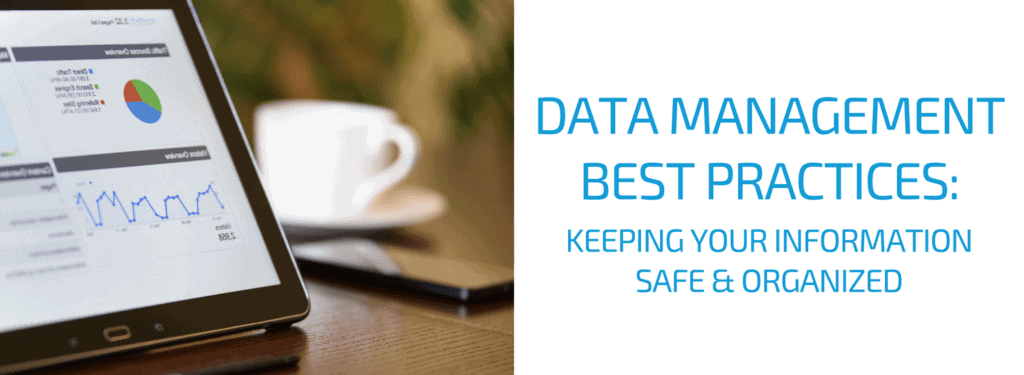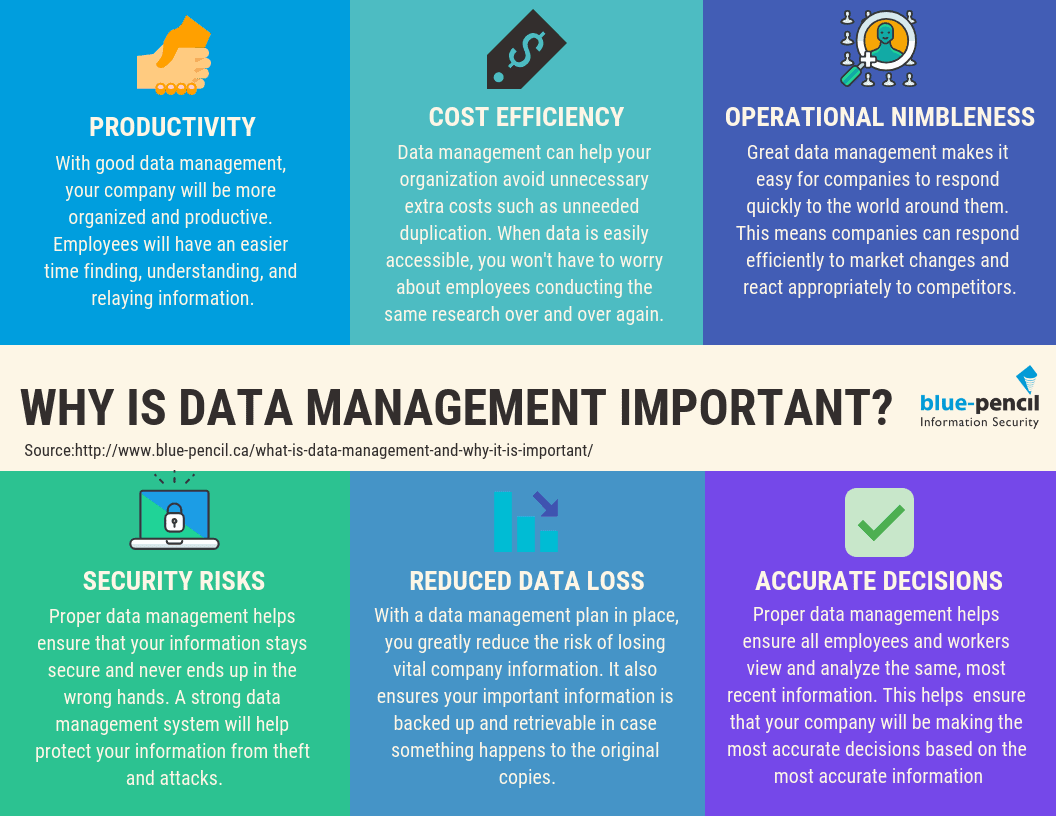
Looking for data management best practices for you and your business? Every business, no matter what size or type, should learn great data management practices. That’s because every business has data – likely, lots of important data. Keeping your data organized and safe will, in turn, keep you, your business, and your employees safe too. To learn more about data management, contact the experts at Blue-Pencil now!
Ready to keep your information safe and secure?
Data Management Best Practices
Not sure where to begin when it comes to data management? Check out these five data management best practices to help you keep your company’s important and confidential information safe, secure, and organized.
1. Work With a Data Management Company
One of the best ways to keep your data, documents, and records safe is by working with a professional data management company. If you do not want the hassle of organizing and securing your business’ important information yourself, there are companies that will gladly do it for you.
A data management company will have all the technology, resources, and knowledge to keep your personal information and records safe. They will not only store records such as documents, but they can also offer organizational solutions. This means your active files will be easily accessible either off or on-site!
Blue-Pencil offers comprehensive data management solutions such as:
- Secure records storage for long-term files
- Vital records protection for your most critical records
- Online document management
- Custom and special solutions tailored for you and your business
- And more!
2. Create a Data Management Plan

Whether you choose to work with a data management company or plan on doing the work yourself, it’s good to have a plan in place. If you create and implement a data management plan before you find yourself with piles of documents and records, it can help you stay organized throughout the entire lifecycle of your data.
Before you create your plan, you should think about the many ways you plan to organize and secure your data. Your plan should include information such as:
- How you will name your files – consistent and descriptive names
- How you will back up your data
- Where you will store your data
- Who will have access to your data
- How you will keep highly sensitive information secure
Some companies choose to work with data management companies for part of their data management plan. For example, smaller companies may choose to manage day-to-day documents and files, while using a data management company to store old records and confidential documents. It is up to each business owner to decide what is the best choice for their budget, employees, and company.
3. Prepare for Cybersecurity Threats
Unfortunately, cybersecurity threats are becoming more and more common – and complex. Though you may think small businesses are immune to these threats, that is actually not the case at all. Smaller businesses are often more vulnerable because they do not have the know-how or security practices in place to prevent attacks.
Since all companies, both big and small, can be subjected to cybersecurity threats and attacks, it’s important to prepare. Proper preparations for cyber threats should be outlined in your data management plan. Your plan should contain information about what to do in case of an attack, who to call (third parties equipped to deal with attacks), how employees should act, etc. Being prepared in case the unexpected occurs will give your company a much better chance of protecting your important data.
4. Assign Roles and Classify Data
Restricting access to data is one of the best ways to ensure it remains safe and secure. The only people who access and look through sensitive information should be employees who have been thoroughly trained and background checked.
The other part of this equation is ensuring your data is classified. Classifying information is a practice that puts data into categories. Once data is properly classified, it should be easy to access and retrieve. Before you begin classifying data, you should have written procedures that guide how new data is classified so everyone is on the same page.
Once you have classified data, you can assign your selected individuals to be in charge of the data. You may select one or two employees to be in charge of one data class, or select a number of employees to oversee all file management. Roles and ratios will depend on how much data you have and what your data management plan entails.
5. Educate Employees
Not all data is created equal. Some files are only needed in the short term or can be thrown away at the end of the day. Other documents should be securely shredded when no longer in use. Some records, like tax records, must be kept for a minimum of 7 years, or your company could face legal consequences.
Along with your data management plan, you should educate employees and everyone on your team as to best data management practices. Employees should be able to tell the difference between highly sensitive data vs unimportant information. They should be aware of your classification system, and how to help prevent cybersecurity threats. Ensuring your whole team, even those you do not think will be regularly accessing data, is trained will help prevent avoidable mistakes from occurring.
What is Data Management?
Now that you know all about the best data management practices for you and your business, you may be wondering what exactly is data management. Data management is “the control, secure access, retention, and disposal of all of your company’s information”. Essentially, data management is how you handle, store, use, and eventually destroy all of the information you and your company produce.
Why is data management such a big deal? Unfortunately, ineffective or improper data management methods can lead to serious problems such as information leaks, lost tax information leading to failed audits, and cybersecurity attacks.
Ineffective data management costs companies 12% a year, or on average $120,000 annually for a company with $1M in sales.
Applying these best data management practices to your workplace will help you avoid unnecessary headaches or more serious consequences. When you work with a data management company, you can rest assured that they will keep your information safer and more organized than ever before, so you can have peace of mind!
Why Is Data Management Important – An Infographic
Still want to learn more about the importance of data management? Check out our infographic below! Click on the image to view a large version.
Keep Your Company Information Safe With Blue-Pencil!
Did you know that shredding sensitive documents is part of great data management? Learn more about Blue-Pencil’s office shredding service program in the quick video below!

Blue-Pencil helps empower Canadian organizations to reach new heights with friendly and efficient document management services. Customer service is not only a slogan but something we practice by investing in our strategic partners.
Located in Oakville, we have grown our document security business over the past 10 years, serving more than 6,000 organizations including small and medium-sized companies as well as Fortune 500 businesses.
“Blue-Pencil is reliable and efficient. Their customer service is the best in the industry!”
– Carrie Postma, Read more testimonials here!
We have recently launched two new divisions; Documents Storage and Records Management division and Document Imaging and Scanning Solutions division. This allows us to offer full circle, comprehensive solutions for information security management. We service the GTA and surrounding cities – click here for a full list of our service areas. If you’d like to learn more about us and what we can do for you contact us today!
Sources:







